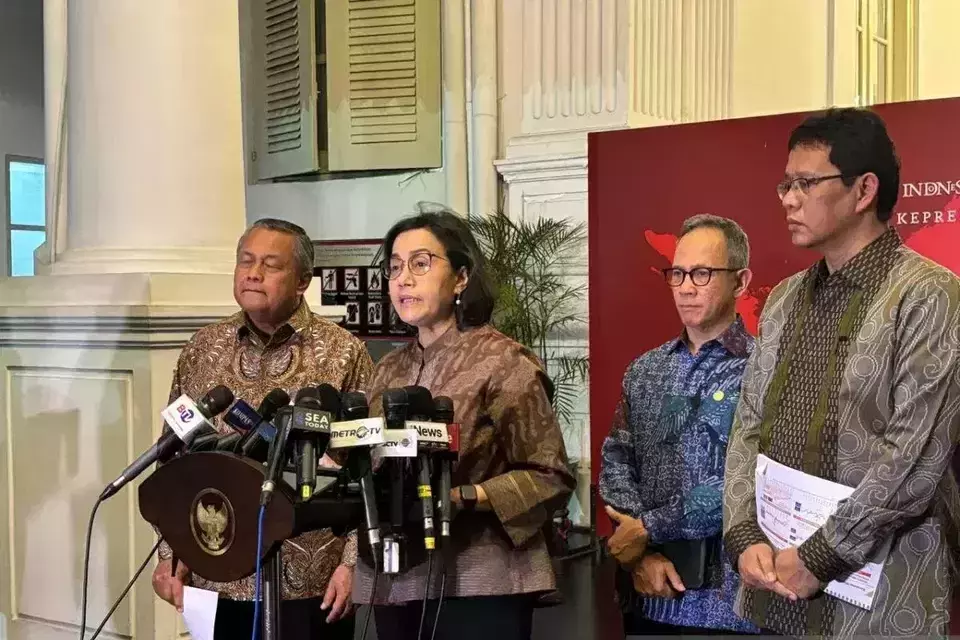 President Joko “Jokowi” Widodo convened the Financial System Stability Committee (KSSK) at the Presidential Palace on Thursday to address the recent depreciation of the rupiah and current economic developments. The KSSK expressed confidence that the rupiah would strengthen due to Indonesia’s solid economic fundamentals.
President Joko “Jokowi” Widodo convened the Financial System Stability Committee (KSSK) at the Presidential Palace on Thursday to address the recent depreciation of the rupiah and current economic developments. The KSSK expressed confidence that the rupiah would strengthen due to Indonesia’s solid economic fundamentals.
The KSSK consists of the Finance Minister, the Governor of Bank Indonesia, the Chairman of the Financial Services Authority (OJK), and the Chairman of the Deposit Insurance Agency (LPS).
As of the close of trading on Thursday, the rupiah had weakened by 65 points (0.4 percent), reaching Rp 16,430 per US dollar, significantly exceeding the state budget’s assumption of Rp 15,000 per dollar. The rupiah has weakened more than 6 percent year to date.
Bank Indonesia Governor Perry Warjiyo asserted that the rupiah’s fundamentals remain strong, attributing the recent depreciation to market sentiment. “Fundamentally, the rupiah is poised to strengthen. The month-to-month fluctuations are driven by sentiment, but the overall trend is upward,” Perry stated.
Perry explained that exchange rate movements are influenced by both fundamental factors and short-term sentiments. He believes the rupiah will appreciate due to factors such as lower inflation, recently at 2.8 percent, robust economic growth at 5.1 percent, and a 12 percent credit growth from the banking sector.
Short-term sentiments negatively affecting the rupiah included geopolitical tensions in the Middle East in May and the unexpected decision by the US Federal Reserve to delay interest rate cuts. During this period, Perry noted that Bank Indonesia intervened by raising interest rates, resulting in the rupiah strengthening from Rp 16,600 to Rp 15,900.
“This demonstrates the rupiah’s ability to strengthen once short-term sentiments subside. The recent decline is again due to global factors, particularly the Fed’s rate decisions, which are uncertain until the end of the year. We anticipate one rate cut by year-end,” he explained.
Global factors also impacting the rupiah include the European Central Bank’s (ECB) initiation of interest rate cuts. Domestically, increased corporate demand in the second quarter, especially in June 2024, influenced the rupiah.
“Typically, in the second quarter, corporations need to repatriate dividends and pay debts. This demand usually diminishes by the third quarter,” Perry added.
Additional pressures on the rupiah stem from perceptions regarding future fiscal sustainability, creating sentiments that affect the currency.
Finance Minister Sri Mulyani highlighted that Indonesia is closely monitoring global economic issues and developments from the US, Europe, and China that impact the national economy.
“We will continue to monitor these factors to minimize negative impacts, such as the Fed’s interest rate decisions and developments in Europe,” she explained.
Sri Mulyani emphasized that the government is also observing exchange rate movements and the yields on government securities (SBN). Indicators such as the real sales index, which reflects consumer recovery in May and June, the Mandiri Spending Index, public confidence, cement, and electricity consumption, and the Purchasing Managers’ Index (PMI) all remain stable, providing a strong foundation for economic growth in the second half of the year.
“Banking sector credit growth is also rising, with increases in investment, working capital, and consumer loans. This indicates an improved intermediary function in the banking sector,” she explained.
Regarding the 2024 state budget (APBN), Sri Mulyani assured that it will continue to be managed prudently. She noted fluctuations in exchange rates, oil prices, and SBN yields, which affect the budget’s posture, but these are being monitored for their financing implications.
“As is known, this year’s deficit is estimated to be a maximum of 2.8 percent. We are maintaining our financing well by using last year’s budget surplus (SAL), which amounted to Rp 100 trillion. We are using this to reduce the financing needs through the market, and this can keep SBN yields at a level that, although rising, is still manageable,” she explained.
The Ministry of Finance, according to Sri Mulyani, is also coordinating with Bank Indonesia, which maintains exchange rate stability. She stated that the fiscal and monetary authorities are working well together in the face of market and global dynamics.
Source from Jakarta Globe
Original News HERE
































